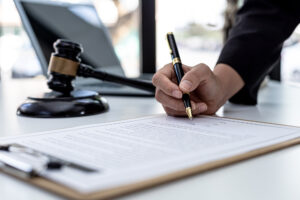
If you have too much to drink and are pulled over by police, you may eventually find yourself in handcuffs and under arrest for driving while intoxicated. A DWI charge may have you feeling down and depressed, but should you just accept your fate and plead guilty to the crime? We explain why it’s rarely in your best interest to plead guilty to DWI, even if the odds seem heavily stacked against you, in this blog.
Should I Just Plead Guilty?
If you’re arrested and charged with DUI, you may feel like it’s just a waste of time to draw out the court proceedings, especially if you believe that police have enough evidence to earn a conviction. It’s normal to feel this way, especially if a breathalyzer test shows that you are clearly over the legal limit. However, that doesn’t mean you should just plead guilty and pray that the judge goes easy on you, because you’re essentially accepting a worst case scenario – a guilty verdict with an outcome that’s out of your control.
By pleading not guilty and having a lawyer help build a defense, it’s a lot more likely that you can avoid the worst case scenario. Here’s how:
Evidence Review – As we’ve said on the blog in the past, the ends can’t simply justify the means. If police illegally pulled you over or there were issues with their evidence collection, you may be able to get the case dropped or at least make it much harder for the other side to earn a conviction. At attorney will review the arrest and evidence collection to see if there are any opportunities for building a case.
Buys You Time – Pleading not guilty buys you some time to let the dust settle and really determine your best move going forward. It can give you time to you sort out some family, financial or work-related matters ahead of a court decision, and it also provides you with opportunity to show to the court that you take the matter seriously. We oftentimes recommend that our clients begin or complete an alcohol education or similar substance abuse course while their case is playing out. Not only may it end up being a requirement should you end up convicted, but it also sends a message to the judge that you’re interested in moving on from your mistake, and that can actually go a long way in helping you at sentencing.
Negotiate A Plea Deal – Finally, pleading not guilty to a DWI charge is oftentimes the right move because it gives you and your attorney time to negotiate a plea deal with the other side. Even if the odds seem stacked against you, it’s going to take time, money and other resources to earn a conviction, and oftentimes the prosecution is willing to make a deal in order to put the case to an end. You may still end up pleading guilty to DWI, but you may be able to negotiate a bit in sentencing, or your lawyer can see if they can negotiate a deal for a “wet reckless” instead of a DWI. If the other option is a guilty sentence, you have nothing to lose by taking a meeting with the prosecution and seeing if they’d be willing to make any concessions if you’d consider agreeing to a plea deal.
Pleading guilty to DWI seals your fate, whereas pleading not guilty and working to understand your options gives you a higher likelihood of avoiding a worst case scenario. Your odds of achieving a favorable outcome also increase if you connect with an experienced lawyer like Avery and the team at Appelman Law Firm. For more information, or for help with a different criminal matter, reach out to our team today at (952) 224-2277.





